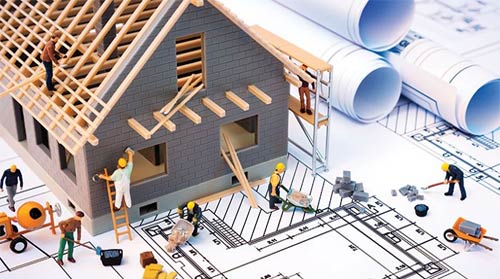 Whether you’re doing a renovation or building your dream home from the ground up, a whole host of issues can wreak havoc on the construction process. And how well prepared you are to deal with them could make the difference between a minor annoyance and a major migraine. Through proper preparation and planning, you can mitigate the risk of running into difficulties and enjoy a smoother and less stressful build. Let’s take a look at some of the most common construction complications and how to avoid them.
Whether you’re doing a renovation or building your dream home from the ground up, a whole host of issues can wreak havoc on the construction process. And how well prepared you are to deal with them could make the difference between a minor annoyance and a major migraine. Through proper preparation and planning, you can mitigate the risk of running into difficulties and enjoy a smoother and less stressful build. Let’s take a look at some of the most common construction complications and how to avoid them.
Delays
Delays are a common occurrence in the construction industry and cause considerable strain on the homeowner. There are several reasons for a contractor to fall behind schedule, many of which are outside of their control. Bad weather is one example, as excess rain, wind, or heat could make it too dangerous to work on site. Astute project managers factor in a few extra days into the schedule to account for these inevitabilities.
Other common causes could be a crucial worker falling ill or a supplier failing to deliver materials on time. Although these are also inevitable, an experienced contractor will have a good back up plan in place, which could include contacting alternative suppliers or finding another task to do in the meantime. Ask your contractor about their contingency plans to gauge their readiness for such events.
Accidental Injury
Although most house builders do the right thing, construction is still an inherently dangerous industry, which is heavily regulated in Australia. Should a worker suffer a significant injury on the job, the site will likely get shut down until an independent audit can determine it’s safe. And that process will delay your project for a substantial amount of time.
Furthermore, any injuries sustained by an uninsured worker can cause a massive legal problem for both the homeowner and the builder. Quiz your contractor on what kind of insurance they have got and keep an eye out for any unsafe work practices on site.
Unexpected Costs
No matter how carefully you plan your project, it’s not uncommon to encounter unexpected expenses. Examples include a blowout in material costs, termite damage to the walls, or asbestos in the ceiling. Construction contracts have a clause in place to address unexpected costs.
Generally speaking, if the problem is something the contractor couldn’t have reasonably known about, then it’s considered unforeseen circumstances and will be at the homeowner’s expense. It’s wise to keep around 10% extra to cover these costs. On the other hand, if the contractor should have known about or identified the problem at the time of the quote, then they should be liable to rectify the issue. Exactly who’s liable isn’t always clear, so seek independent advice if in doubt.
Problems with the Contract
Don’t begin a substantial construction project without a contract, no matter how trustworthy the builder may seem. If you do, the builder could disappear the moment an issue arises, never to be seen again.
And it isn’t enough to just have any old contract, as the document needs to be legally binding and cover several key components:
- The work timeline
- The costings
- The payment schedule
- Detailed information on the project
Although it may seem like a bunch of legal mumbo jumbo, you should take the time to read the contract, keeping an eye out for anything that looks out of place. For example, there’s no reason you should ever have to pay in full before all work has been completed. Both parties have to sign a contract for it to be legally binding. Keep a copy for yourself so that you can refer to the original whenever you need.
A Failure to Meet Expectations
Plenty of dodgy home builders in Adelaide will happily do a haphazard job and leave the homeowner in the lurch. Even if you’ve got a watertight contract, it isn’t always easy to take a builder to court for shoddy workmanship.
The best preventative measure is to go with a builder who’s established a solid reputation in the field. A company that’s been providing quality service to the community for decades is far more likely to do a good job than a little-known independent.
By being aware of the most common issues that can affect the construction process, it’s far easier to prepare yourself for the worst. Keep these five potential construction pitfalls in mind to safeguard your assets during the construction phase.






